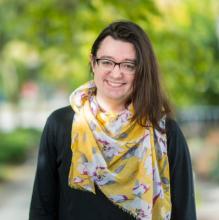I am interested in the role of story in creating and disrupting deficit narratives. My research uses digital mapping to visually explore Indigenous nationhood through narratives of role models, inspirations, and heroes.
Research Description
The ability to see yourself as an accepted and valued member of society is essential to developing a positive sense of self and cultural identity. Enhancing positive self and cultural identity has been shown to reduce suicide, child welfare apprehensions, drug addiction, and homelessness. However, this is no easy task for Indigenous people when Canadian literature and media overwhelmingly focuses on negative or deficit stories about Indigenous people.
My research asks if stories that celebrate Indigeneity can disrupt deficit narratives, and if so, can amplifying positive stories benefit our communities and contribute to the larger conversation on Indigenous identity and nationhood? In other words, I am exploring the role of narrative representation or –story, in constructing and challenging political agency, authority, and legitimacy.
To do this, I am gathering, mapping, and analyzing narratives of Indigenous agency, authority, and legitimacy, as expressed through stories of role models, inspirations, and heroes. My project uses thematic analysis and geo-spatial information modelling to identify patterns in the construction of positive Indigenous identity narratives and their relationship to the land. I am looking for common ontological underpinnings that speak to the nature of Indigenous survivance narratives in and across individuals, families, and communities. I hope that the emergent cartographies will provide culturally relevant insights into the assurgent, land-based, and culturally situated practices of Indigenous nationhood in material ways that challenge colonial renderings of space.
My research project, the Âhkameyihtamowin Project (We Rise), engages the practice of wâhkôhtawin and the concept of wâhkôhtamowin at a local and national scale. In practice wâhkôhtawin means making visible the relationships or, sociocultural landscapes we are embedded in and from which we interpret and engage the world. The practice of wâhkôhtawin makes clear the relational networks between land, kith and kin. It is through these relations that we contextualize history, culture, and knowledge systems.
My wâhkôhtawin (relationality): In my life, I have been gifted two families. The one I was born to shares blood (settler-mix): we were not raised together but most of us have found each other as adults. The family that raised me is from Muskowekwan, Saskatchewan, Treaty 4 territory. They are Nêhiyaw and Saulteaux (Oji-Cree) and Chicago-line Métis. I come to them by adoption. They adopted me in accordance with our customary laws and raised me with a strong sense of community and culture. Currently, I am working with Muskowekwan to gather stories of role models, inspirations, and heroes in our community. My goal is to amplify community narratives that celebrate Indigeneity. By mapping these stories to the land, I am looking for culturally relevant insights into how narratives speak to and shape Indigenous nationhood.
What does being a Public Scholar mean to you?
It is important to me that my work contributes to creating a better, more equitable world for the seventh generation. I hope to use my work to empower youth, raise awareness of shared values and aspirations, and promote the alignment of Canadian policy and practice with national and international human rights conventions and declarations. Being a Public Scholar means working with community to ensure my research is a transformative praxis for action-based outcomes that centre Indigenous agendas.
In what ways do you think the PhD experience can be re-imagined with the Public Scholars Initiative?
The Public Scholars Initiative strengthens the relationship between communities and academia by positioning the Ph.D. experience as action-oriented and community-focused with practical outcomes. As a UBC Public Scholar, I am cultivating relationships with those who think beyond existing configurations of power; and connect with role models engaged in acts of ‘moral imagination’ that inspire real-world change.
Why did you decide to pursue a graduate degree?
My master’s research looked at how cultural continuity and kinship care are disrupting Indigenous overrepresentation in the child welfare system. The findings of that research inspired me to further explore the role of narrative representation in constructing positive self and cultural identity.
Why did you choose to come to British Columbia and study at UBC?
Hosted on unceded xʷməθkʷəy̓əm territory, UBC is a place where world class Indigenous academics and knowledge keepers come together. This is a centre of excellence, and I am grateful to be here.
What aspects of your life or career before now have best prepared you for your UBC graduate program?
A graduate degree is not an end goal – it’s a tool to do what matter. When I was young I did an internship with Corrections Services Canada – Indigenous Programs. While there, I worked with Elders, Indigenous Liaisons, and family members who encouraged me to get an education and contribute to our community. Inspired by them, I got my high school upgrading, went to college, then university. I now hold several degrees in Indigenous Studies (& Criminology) and am working towards a PhD. The experiences, education, and support that I have been gifted are all essential in preparing me to contribute to my community, and other communities across Turtle Island.
Do you have any tips for students from your home country coming to Canada / to UBC Grad School?
For Indigenous Students – Turtle Island is your home. UBC sits on unceded xʷməθkʷəy̓əm territory. Musqueam has expressed an invitation to Indigenous students to come to this place of gathering & learning – you belong here. The colonial systems and buildings that sit on Musqueam territory can feel alienating, but there are Indigenous People here – teaching, learning, connecting; you are one of them –you belong here. Listen for the land, the knowledge keepers, and your ancestors; they are all whispering - you belong here.
As Public Scholars our work needs to make us accountable, and accessible to the communities we serve so that we can provide tangible results.




